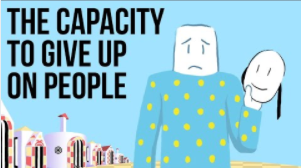For noble and very understandable reasons,we’ve come to associate maturity and kindness with a capacity not to give up on people.
出于高尚而又合情理的原因,我们开始把成熟和善良与不放弃他人的能力联系起来。
Our heroes and heroines keep faith with those they love.
我们的男女主人公忠于他们所爱的人。
They don’t throw in the towel when trouble rears its head.
遇到麻烦时,他们不会认输。

They put up with the hardships and friction.
他们忍受着困难和摩擦。
Running away is disloyalty.
逃跑等同于不忠。
Many things are dispensable: people shouldn’t be.
很多东西都是可有可无的,但人不应该如此。
But this broad and generous truth can be indanger of missing out on an important caveat:
这一事实广泛而慷慨,但这可能会有错过重要警告的危险:
that health and maturity may also require, at points, a subtle capacity to give up onone or two people,
健康和成熟有时也需要一种微妙的放弃他人的能力,
not always and indefinitely to keep giving them the benefit of the doubt, not invariably to forgive them one more time,
并不能总是无限期地相信他们(即使有嫌疑),也不能总是再次原谅他们,
not relentlessly to imagine the nice things they might really really have meant beneath the thoughtless and unkind things they actually did and said.
也不是不停地去想象,他们所做和所说的那些轻率和刻薄的事情背后,他们可能本意是好的。
We might need occasionally to despair of someone– as the price to pay for keeping faith with ourselves.
我们可能偶尔需要对某人绝望——作为自己守信的代价。
It’s in the lives of children that we see the inability to give up on someone take on its starkest, and most regrettable forms.
正是在孩子们的生活中,我们看到了他们无法放弃他人,这是最明显、最令人遗憾的表现形式。
By their nature and circumstance, children cannot give up on those entrusted with looking after them if and when the latter are disappointing or cruel;
由于他们的天性和环境,孩子们不能放弃那些托付照顾他们的人,如果委托人令人失望或残忍;
children present us with troubling exemplars of the impulse to keep going cost with a person who offers one love
孩子们的例子让我们不安,让我们看到一种冲动,即不惜任何代价与一个给予我们爱的人继续交往
– even when that love is blended with thedarkest and most unhealthy elements.
——即使这种爱掺杂了最黑暗、最不健康的成分。
Even when be set by emotional neglect, coldness,unreliability, meanness, brusqueness, broken promises to improve and worse, children will think some of the following:– ‘Maybe they will change’
即使情感上被一些忽视、冷漠、不可靠、刻薄、粗暴、无法兑现的承诺所困扰,甚至在更糟糕的处境下,孩子们也会产生下面的一些想法: ——“也许他们会改变”
The child places infinite faith in the capacity of the loved one to evolve in a desired direction.
孩子们对自己所爱的人有无限的信心,相信他们有能力朝着自己想要的方向发展。
Whatever the lack of outward evidence, the child imagines the care giver coming to important realisations, rethinking their position, seeing the light.
不管外在证据有多缺乏,孩子都会想象照顾者会有重大的觉悟,重新思考他们的立场,从而看到光明。
By a form of magical thinking, the child clings to the idea of the adult being on the cusp of transforming themselves into the personthey so badly need them to be.
通过一种神奇的思维方式,孩子们坚持认为,成年人即将把自己变成他们迫切需要的那个人。
– ‘Maybe the outward behaviour is bad,but inside they are good’: Heaven knows the outward stuff may not be pretty.
“也许外在的行为是不好的,但内在的行为是好的”:天知道外在的东西可能并不漂亮。
There might be shouting, stonewalling, outright beastliness…but the child holds on to the notion that – where it counts – the adultis good.
孩子们可能会大喊大叫、互相阻挠、表现出赤裸裸的兽性行为……但孩子们坚持认为——在重要的地方——成人是好的。
The fundamental truth about them must be sound:the center of them is sweet, touching, warm and decent.
关于它们的基本真理必须是健全的:它们的核心是甜蜜、感人、温暖和体面。
The child may be the butt of the adult’s most vicious moods but they are, through it all, always also their most devoted and fervent defenders.
孩子可能是成年人坏情绪的发泄对象,但在整个过程中,他们始终是他们最忠诚、最热心的捍卫者。
– ‘Maybe the problem is that I am bad…’The difficulties can’t be disputed but their origins are up for grabs and here the child shows a tragically intense degree of imagination.
-“也许问题在于我很坏……”这些困难是无可争议的,但他们的出身是可以争取的,而在这里,孩子们展现出了一种悲剧般强烈的想象力。
Yes, there is badness around, but that mus tbe because they, the child, are ultimately somehow to blame.
是的,坏的事情是存在的,但那一定是因为他们,孩子,最终在某种程度上应该受到责备。
If only they could be different, the adult wouldn’t be so tricky.
要是它们能不这样就好了,成年人就不会这么狡猾了。
There is one thought that must be warded off above all others: that the adult might just be a mean and self-serving mediocrity.
必须避免一种想法,那就是:成年人可能只是一个卑鄙、自私的平庸之辈。
That is simply not possible.
这根本不可能。
Better to be a monster or wretch oneself than to have ended up in the hands of a parent unworthy of respect.
与其最终落在不值得尊敬的父母手中,不如自己成为一个怪物或可怜虫。
– ‘No one and nothing else could be better.’
-“没有人比你更好了。”
Children have no options.
孩子们别无他选。
They can’t run away, begin again or say they’ve had enough.
他们不能逃跑,不能重新开始,也不能说他们受够了。
The world isn’t broad.
世界并不宽广。
The best of childhoods is an open prison.
最好的童年是一个开放的监狱。
Therefore, children don’t even picture themselves in other circumstances.
因此,孩子们甚至不会把自己想象成其他环境中的自己。
What is has to be.
是什么就必须是什么。
Those who have most to complain about don’t even raise their voice.
那些抱怨最多的人甚至都不提高嗓门。
Frighteningly, each of these positions has its adult equivalent.
令人恐惧的是,每一种姿态都能对应到成年人身上。
In certain unfulfilling relationships, we may have as much of a skill as the most unfortunate child (probably the child we once were)
在某些不令人满意的关系中,我们可能和最不幸的孩子一样有技巧(可能是曾经的我们)
at the art of justifying why we are here, why we are to blame, why they are innocent and why we cannot move.
在解释为什么我们会在这里,为什么我们应该受到责备,为什么他们是无辜的,为什么我们不能离开。
It is we in particular, those remorselessly skilled at not giving up, who need to hear a curious-sounding lesson in being a little less loyal.
尤其是我们这些不轻易放弃的人,需要听一段听起来奇怪的教训,让自己少一点忠诚。
We need to hear that, surprisingly, some people just don’t change:
我们需要听到的是,令人惊讶的是,有些人就是不会改变:
that their characters have been bolted shut through trauma and there is no chance that they will ever
他们的性格因为创伤而被封闭起来,永远也不会有这样的机会
– whatever they may say and however intensely they promise– display any evolution.
——无论他们说什么,无论他们做出多么强烈的承诺——永远也不会展示出任何进展。
We need to hear that surprisingly, some people aren’t entirely good and we aren’t necessarily the problem.
我们需要听到令人惊讶的信息,有些人并不完全是好人,我们也不一定是问题所在。
We need to learn to blame and get annoyed with someone other than ourselves.
我们需要学会责备他人和让他人恼怒,而不是责备自己和生自己气。
We need to do something very strange: walk away.
我们得做点陌生的事,走开。
This is no sign of cowardice or weakness of character.
这不是怯懦或性格软弱的表现。
It’s a sign that we have (finally) learnt to love ourselves and so place our needs where these should always have been: at the centerof our considerations.
这标志着我们(终于)学会了爱自己,所以我们把自己的需求放在了应该一直存在的地方:我们考虑的中心。












